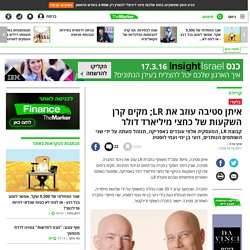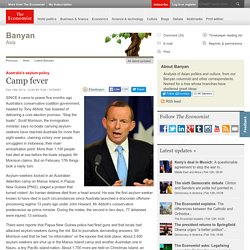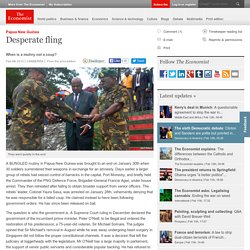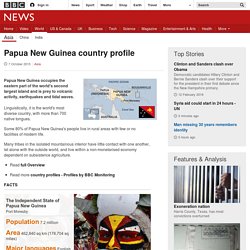

Papua New Guinea Consulate In Israel. איך הרוויחו הטייסים איתן סטיבה, רועי בן-ימי ועמי לוסטיג מאות מיליוני דולרים באפריקה. לפני כ-30 שנה הם היו נפגשים בחדרי התדריכים של אחת הטייסות בבסיס חיל האוויר.

זה היה לפני תרגילים משותפים של קרבות אוויר, שנערכו בין טייסת פאנטומים שנאבקה על תהילתה לבין טייסת צעירה, אשר הוקמה במיוחד כדי לקלוט את ראשוני מטוסי ה-F16 שהגיעו לישראל באותן שנים. האווירה היתה תחרותית במיוחד. בין אנשי טייסת הפאנטום שהשתתפו באותם תרגילים היה גם הנווט הצעיר מאיר שמיר. בין אנשי ה-F16 היו שלושה טייסים שכבר אז, על-פי חבריהם לטייסת, בלט הקשר המיוחד ביניהם - איתן סטיבה, עמי לוסטיג ורועי בן-ימי. השבוע נפגשו שוב כל היריבים, והפעם לא בחדר תדריכים אלא במשרדיה המפוארים של קבוצת LR שבבעלות סטיבה, לוסטיג ובן-ימי. החשיפה התקשורתית שליוותה את ההודעה על העסקה אינה דבר חדש בעבור שמיר, המככב במדורי הכלכלה והספורט בשנים האחרונות. באופן נדיר, כשמדובר בקהילה העסקית המקומית, הצליחו השותפים להיעדר גם ממדורי הרכילות ולהימנע מחיים ראוותניים ומושכי תשומת לב. הקבוצה פעילה במגוון תחומים - החל במסחר בנשק, דרך הקמת שדות תעופה, פרישת מערכות הגנה אווירית והפעלת תקשורת סלולרית ולוויינית ועד חקלאות.
חמש הפלות ביום ציונות או עסקים. איתן סטיבה עוזב את LR; מקים קרן השקעות של כחצי מיליארד דולר - קריירה. איתן סטיבה, מייסד ומנכ"ל משותף בחברת LR עוזב את ניהול החברה.

סטיבה, שבין היתר הופקד בחברה על תחום הניהול הפיננסי, מקים בימים אלו קרן השקעות בהיקף של כחצי מיליארד דולר באפריקה, שתפעל באותם האזורים והתחומים שבהם פועלת LR. החברה, שבמשך קרוב ל-30 שנה נוהלה במשותף על-ידי שלושת מייסדיה, תמשיך להיות מנוהלת כעת בידי רועי בן-ימי ועמי לוסטיג, שני מייסדי החברה האחרים. סטיבה יישאר בחברה כשותף ודירקטור. מקור המעורה בנעשה בחברה טוען שהמהלך נעשה גם על רקע מתיחות בין סטיבה לבין שני שותפיו. בן-ימי מסר בתגובה: "סטיבה החליט להקים קרן הפועלת במדינות וטריטריות שבהם אנחנו פועלים, ולשם כך הוא צריך להקדיש את מרצו וזמנו לעניין זה. סיפורה של LR נחשף לראשונה באפריל 2008, על-ידי העיתונאי גיא לשם במוסף MarkerWeek. עסקיה של הקבוצה מגוונים היא החלה את דרכה במסחר בנשק ואימון כוחות צבאיים, אך עסקה גם בהקמת שדות תעופה ופרישת מערכות הגנה אוויריות, תקשורת סלולרית, וחקלאות. שער שינוי לאתר Finance , אולם עסקה זו התפוצצה כעבור מספר חודשים. את תגובתו של סטיבה, השוהה בחו"ל, לא ניתן היה להשיג. Innovative Agro Industry.
Hong Kong Science Museum - Opening Hours. The Economist. SINCE it came to power five months ago Australia’s conservative coalition government, headed by Tony Abbott, has boasted of delivering a core election promise: “Stop the boats”.

Scott Morrison, the immigration minister, says no boats carrying asylum-seekers have reached Australia for more than eight weeks, claiming victory over people smugglers in Indonesia, their main embarkation point. More than 1,100 people had died at sea before the boats stopped, Mr Morrison claims. But on February 17th things took a nasty turn. Asylum-seekers locked in an Australian detention camp on Manus Island, in Papua New Guinea (PNG), staged a protest that turned violent. An Iranian detainee died from a head wound. There were reports that Papua New Guinea police had fired guns and that locals had attacked asylum-seekers during the riot. Frustration over delays and failures to deal with asylum claims seem to have sparked the outbursts. (Picture credit: The Economist. The Economist. The Economist. They went quietly in the end A BUNGLED mutiny in Papua New Guinea was brought to an end on January 30th when 30 soldiers surrendered their weapons in exchange for an amnesty.

Days earlier a larger group of rebels had seized control of barracks in the capital, Port Moresby, and briefly held the Commander of the PNG Defence Force, Brigadier-General Francis Agwi, under house arrest. They then retreated after failing to obtain broader support from senior officers. The rebels' leader, Colonel Yaura Sasa, was arrested on January 28th, vehemently denying that he was responsible for a failed coup. He claimed instead to have been following government orders. The question is who the government is. In December Sir Michael publicly called on the armed forces to honour the Supreme Court decision and restore his government. The Economist. The Economist. Papua New Guinea country profile. Papua New Guinea occupies the eastern part of the world's second largest island and is prey to volcanic activity, earthquakes and tidal waves.

Linguistically, it is the world's most diverse country, with more than 700 native tongues. Some 80% of Papua New Guinea's people live in rural areas with few or no facilities of modern life. Many tribes in the isolated mountainous interior have little contact with one another, let alone with the outside world, and live within a non-monetarised economy dependent on subsistence agriculture. Population 7.2 million Area 462,840 sq km (178,704 sq miles) Major languages English, Tok Pisin, Hiri Motu Major religions Christianity, indigenous beliefs Life expectancy 61 years (men), 66 years (women) Currency kina Getty Images Head of state: Queen Elizabeth II, represented by a Governor-General. Prime minister: Peter O'Neill Image copyright Getty Images Read full profile The government operates a national network and provincial stations.
Read full timeline.